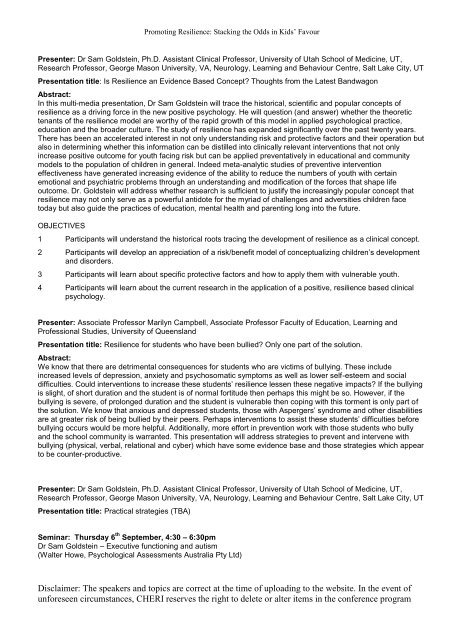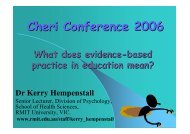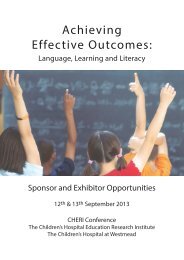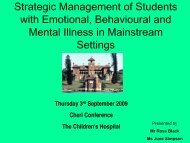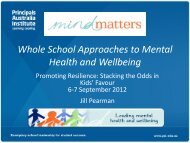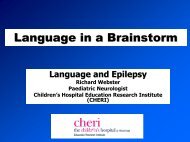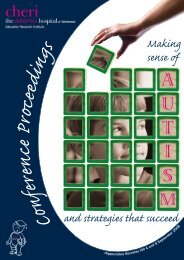Disclaimer: The speakers and topics are correct at the time of ...
Disclaimer: The speakers and topics are correct at the time of ...
Disclaimer: The speakers and topics are correct at the time of ...
Create successful ePaper yourself
Turn your PDF publications into a flip-book with our unique Google optimized e-Paper software.
Promoting Resilience: Stacking <strong>the</strong> Odds in Kids’ Favour<br />
Presenter: Dr Sam Goldstein, Ph.D. Assistant Clinical Pr<strong>of</strong>essor, University <strong>of</strong> Utah School <strong>of</strong> Medicine, UT,<br />
Research Pr<strong>of</strong>essor, George Mason University, VA, Neurology, Learning <strong>and</strong> Behaviour Centre, Salt Lake City, UT<br />
Present<strong>at</strong>ion title: Is Resilience an Evidence Based Concept Thoughts from <strong>the</strong> L<strong>at</strong>est B<strong>and</strong>wagon<br />
Abstract:<br />
In this multi-media present<strong>at</strong>ion, Dr Sam Goldstein will trace <strong>the</strong> historical, scientific <strong>and</strong> popular concepts <strong>of</strong><br />
resilience as a driving force in <strong>the</strong> new positive psychology. He will question (<strong>and</strong> answer) whe<strong>the</strong>r <strong>the</strong> <strong>the</strong>oretic<br />
tenants <strong>of</strong> <strong>the</strong> resilience model <strong>are</strong> worthy <strong>of</strong> <strong>the</strong> rapid growth <strong>of</strong> this model in applied psychological practice,<br />
educ<strong>at</strong>ion <strong>and</strong> <strong>the</strong> broader culture. <strong>The</strong> study <strong>of</strong> resilience has exp<strong>and</strong>ed significantly over <strong>the</strong> past twenty years.<br />
<strong>The</strong>re has been an acceler<strong>at</strong>ed interest in not only underst<strong>and</strong>ing risk <strong>and</strong> protective factors <strong>and</strong> <strong>the</strong>ir oper<strong>at</strong>ion but<br />
also in determining whe<strong>the</strong>r this inform<strong>at</strong>ion can be distilled into clinically relevant interventions th<strong>at</strong> not only<br />
increase positive outcome for youth facing risk but can be applied prevent<strong>at</strong>ively in educ<strong>at</strong>ional <strong>and</strong> community<br />
models to <strong>the</strong> popul<strong>at</strong>ion <strong>of</strong> children in general. Indeed meta-analytic studies <strong>of</strong> preventive intervention<br />
effectiveness have gener<strong>at</strong>ed increasing evidence <strong>of</strong> <strong>the</strong> ability to reduce <strong>the</strong> numbers <strong>of</strong> youth with certain<br />
emotional <strong>and</strong> psychi<strong>at</strong>ric problems through an underst<strong>and</strong>ing <strong>and</strong> modific<strong>at</strong>ion <strong>of</strong> <strong>the</strong> forces th<strong>at</strong> shape life<br />
outcome. Dr. Goldstein will address whe<strong>the</strong>r research is sufficient to justify <strong>the</strong> increasingly popular concept th<strong>at</strong><br />
resilience may not only serve as a powerful antidote for <strong>the</strong> myriad <strong>of</strong> challenges <strong>and</strong> adversities children face<br />
today but also guide <strong>the</strong> practices <strong>of</strong> educ<strong>at</strong>ion, mental health <strong>and</strong> p<strong>are</strong>nting long into <strong>the</strong> future.<br />
OBJECTIVES<br />
1 Participants will underst<strong>and</strong> <strong>the</strong> historical roots tracing <strong>the</strong> development <strong>of</strong> resilience as a clinical concept.<br />
2 Participants will develop an appreci<strong>at</strong>ion <strong>of</strong> a risk/benefit model <strong>of</strong> conceptualizing children’s development<br />
<strong>and</strong> disorders.<br />
3 Participants will learn about specific protective factors <strong>and</strong> how to apply <strong>the</strong>m with vulnerable youth.<br />
4 Participants will learn about <strong>the</strong> current research in <strong>the</strong> applic<strong>at</strong>ion <strong>of</strong> a positive, resilience based clinical<br />
psychology.<br />
Presenter: Associ<strong>at</strong>e Pr<strong>of</strong>essor Marilyn Campbell, Associ<strong>at</strong>e Pr<strong>of</strong>essor Faculty <strong>of</strong> Educ<strong>at</strong>ion, Learning <strong>and</strong><br />
Pr<strong>of</strong>essional Studies, University <strong>of</strong> Queensl<strong>and</strong><br />
Present<strong>at</strong>ion title: Resilience for students who have been bullied Only one part <strong>of</strong> <strong>the</strong> solution.<br />
Abstract:<br />
We know th<strong>at</strong> <strong>the</strong>re <strong>are</strong> detrimental consequences for students who <strong>are</strong> victims <strong>of</strong> bullying. <strong>The</strong>se include<br />
increased levels <strong>of</strong> depression, anxiety <strong>and</strong> psychosom<strong>at</strong>ic symptoms as well as lower self-esteem <strong>and</strong> social<br />
difficulties. Could interventions to increase <strong>the</strong>se students’ resilience lessen <strong>the</strong>se neg<strong>at</strong>ive impacts If <strong>the</strong> bullying<br />
is slight, <strong>of</strong> short dur<strong>at</strong>ion <strong>and</strong> <strong>the</strong> student is <strong>of</strong> normal fortitude <strong>the</strong>n perhaps this might be so. However, if <strong>the</strong><br />
bullying is severe, <strong>of</strong> prolonged dur<strong>at</strong>ion <strong>and</strong> <strong>the</strong> student is vulnerable <strong>the</strong>n coping with this torment is only part <strong>of</strong><br />
<strong>the</strong> solution. We know th<strong>at</strong> anxious <strong>and</strong> depressed students, those with Aspergers’ syndrome <strong>and</strong> o<strong>the</strong>r disabilities<br />
<strong>are</strong> <strong>at</strong> gre<strong>at</strong>er risk <strong>of</strong> being bullied by <strong>the</strong>ir peers. Perhaps interventions to assist <strong>the</strong>se students’ difficulties before<br />
bullying occurs would be more helpful. Additionally, more effort in prevention work with those students who bully<br />
<strong>and</strong> <strong>the</strong> school community is warranted. This present<strong>at</strong>ion will address str<strong>at</strong>egies to prevent <strong>and</strong> intervene with<br />
bullying (physical, verbal, rel<strong>at</strong>ional <strong>and</strong> cyber) which have some evidence base <strong>and</strong> those str<strong>at</strong>egies which appear<br />
to be counter-productive.<br />
Presenter: Dr Sam Goldstein, Ph.D. Assistant Clinical Pr<strong>of</strong>essor, University <strong>of</strong> Utah School <strong>of</strong> Medicine, UT,<br />
Research Pr<strong>of</strong>essor, George Mason University, VA, Neurology, Learning <strong>and</strong> Behaviour Centre, Salt Lake City, UT<br />
Present<strong>at</strong>ion title: Practical str<strong>at</strong>egies (TBA)<br />
Seminar: Thursday 6 th September, 4:30 – 6:30pm<br />
Dr Sam Goldstein – Executive functioning <strong>and</strong> autism<br />
(Walter Howe, Psychological Assessments Australia Pty Ltd)<br />
<strong>Disclaimer</strong>: <strong>The</strong> <strong>speakers</strong> <strong>and</strong> <strong>topics</strong> <strong>are</strong> <strong>correct</strong> <strong>at</strong> <strong>the</strong> <strong>time</strong> <strong>of</strong> uploading to <strong>the</strong> website. In <strong>the</strong> event <strong>of</strong><br />
unforeseen circumstances, CHERI reserves <strong>the</strong> right to delete or alter items in <strong>the</strong> conference program
Promoting Resilience: Stacking <strong>the</strong> Odds in Kids’ Favour<br />
Presenter: Associ<strong>at</strong>e Pr<strong>of</strong>essor Erica Frydenberg, Principal Fellow, Melbourne Gradu<strong>at</strong>e School <strong>of</strong> Educ<strong>at</strong>ion, <strong>The</strong><br />
University <strong>of</strong> Melbourne<br />
Present<strong>at</strong>ion title: Coping skills – concepts <strong>and</strong> constructs to facilit<strong>at</strong>e young people’s social emotional<br />
development<br />
Abstract:<br />
Coping in young people rel<strong>at</strong>es to both current <strong>and</strong> future wellbeing <strong>and</strong> is <strong>the</strong>refore integral to <strong>the</strong> educ<strong>at</strong>ional,<br />
clinical <strong>and</strong> counselling <strong>are</strong>nas. Given <strong>the</strong> diversity <strong>and</strong> multitude <strong>of</strong> situ<strong>at</strong>ions th<strong>at</strong> <strong>the</strong>y encounter it is important to<br />
help young people enhance <strong>and</strong> augment <strong>the</strong>ir coping skills for dealing with present <strong>and</strong> future events. This<br />
present<strong>at</strong>ion will provide an overview <strong>of</strong> contemporary underst<strong>and</strong>ings <strong>of</strong> <strong>the</strong> <strong>the</strong>ory <strong>and</strong> practice <strong>of</strong> coping; wh<strong>at</strong><br />
we have learned <strong>and</strong> wh<strong>at</strong> <strong>are</strong> <strong>the</strong> implic<strong>at</strong>ions for young people’s health <strong>and</strong> wellbeing. Wh<strong>at</strong> is meant by good<br />
coping <strong>and</strong> bad coping will be considered when providing practical tools for wellbeing. <strong>The</strong>re will be a focus on how<br />
adolescents cope <strong>and</strong> how <strong>the</strong>y can be taught to cope more effectively to promote positive mental health through<br />
<strong>the</strong> effective use <strong>of</strong> coping str<strong>at</strong>egies. <strong>The</strong> good news is th<strong>at</strong> coping skills can be both developed <strong>and</strong> evalu<strong>at</strong>ed<br />
throughout <strong>the</strong> lifespan in order to optimize social <strong>and</strong> emotional development.<br />
Presenter: Dr Caroline Mansfield, School <strong>of</strong> Educ<strong>at</strong>ion, Murdoch University, Western Australia<br />
Present<strong>at</strong>ion title: Promoting resilience for teachers <strong>and</strong> <strong>the</strong>ir students: A four dimensional view<br />
Abstract:<br />
Over <strong>the</strong> last 15 years resilience in educ<strong>at</strong>ional contexts has <strong>at</strong>tracted significant <strong>at</strong>tention, particularly in countries<br />
like Australia where student popul<strong>at</strong>ions <strong>are</strong> becoming increasingly diverse <strong>and</strong> <strong>the</strong> teaching pr<strong>of</strong>ession is subject<br />
to high r<strong>at</strong>es <strong>of</strong> <strong>at</strong>trition <strong>and</strong> teacher burnout. Despite ongoing challenges, <strong>the</strong>re <strong>are</strong> individual characteristics <strong>and</strong><br />
contextual fe<strong>at</strong>ures th<strong>at</strong> can promote resilience in schools enabling staff <strong>and</strong> students to thrive, not simply survive.<br />
This present<strong>at</strong>ion will focus on resilience in educ<strong>at</strong>ional contexts, bringing l<strong>at</strong>est findings from Western Australia<br />
<strong>and</strong> around <strong>the</strong> world. Using a four dimensional framework to explore resilience in classrooms, <strong>the</strong> complexity <strong>of</strong><br />
resilience <strong>and</strong> <strong>the</strong> dynamic interplay <strong>of</strong> emotional, social, motiv<strong>at</strong>ional <strong>and</strong> pr<strong>of</strong>essional dimensions <strong>of</strong> teacher<br />
resilience <strong>are</strong> discussed. Str<strong>at</strong>egies teachers can use to enhance <strong>the</strong>ir own resilience <strong>and</strong> promote resilience in<br />
<strong>the</strong>ir classrooms <strong>are</strong> presented. Viewing classroom life from <strong>the</strong> perspective <strong>of</strong> resilience <strong>of</strong>fers opportunities for<br />
teachers maintain <strong>the</strong>ir own wellbeing in <strong>time</strong>s <strong>of</strong> adversity <strong>and</strong> to cre<strong>at</strong>e classroom contexts th<strong>at</strong> promote<br />
resilience for <strong>the</strong>ir students.<br />
Presenter: Clinical Pr<strong>of</strong>essor David Bennett AO, Head, NSW Centre for <strong>the</strong> Advancement <strong>of</strong> Adolescent Health<br />
Present<strong>at</strong>ion title: Fostering psychological wellbeing in young people<br />
Abstract:<br />
Adolescence is a unique <strong>and</strong> fascin<strong>at</strong>ing <strong>time</strong> <strong>of</strong> life when pr<strong>of</strong>ound changes have <strong>the</strong> potential for huge impact on<br />
both current <strong>and</strong> future wellbeing. Notwithst<strong>and</strong>ing <strong>the</strong>ir reput<strong>at</strong>ion as ‘<strong>the</strong> healthiest group in <strong>the</strong> popul<strong>at</strong>ion’, young<br />
people have to cope with ‘<strong>the</strong> perils <strong>of</strong> puberty’ <strong>and</strong> <strong>the</strong> challenges <strong>of</strong> emerging rel<strong>at</strong>ionships <strong>and</strong> identity-seeking.<br />
Experiment<strong>at</strong>ion <strong>and</strong> risk-taking pose dangers to health <strong>and</strong> life while <strong>the</strong> vicissitudes <strong>of</strong> chronic <strong>and</strong> disabling<br />
conditions <strong>are</strong> problem<strong>at</strong>ic for many. And overall, <strong>the</strong> prevalence <strong>of</strong> social <strong>and</strong> psychological problems has<br />
increased! Fortun<strong>at</strong>ely, adolescence is ‘a <strong>time</strong> <strong>of</strong> second chances’. New findings from neuroscience plus research<br />
into p<strong>are</strong>nting <strong>and</strong> school-based programs provide a ‘blueprint’ for helping young people develop resilient traits <strong>and</strong><br />
coping str<strong>at</strong>egies. This present<strong>at</strong>ion will review <strong>the</strong> st<strong>at</strong>e <strong>of</strong> play in young people’s health, some <strong>of</strong> <strong>the</strong> challenges<br />
rel<strong>at</strong>ed to development <strong>and</strong> behaviour, <strong>and</strong> practical approaches to supporting young people’s psychological <strong>and</strong><br />
emotional needs.<br />
<strong>Disclaimer</strong>: <strong>The</strong> <strong>speakers</strong> <strong>and</strong> <strong>topics</strong> <strong>are</strong> <strong>correct</strong> <strong>at</strong> <strong>the</strong> <strong>time</strong> <strong>of</strong> uploading to <strong>the</strong> website. In <strong>the</strong> event <strong>of</strong><br />
unforeseen circumstances, CHERI reserves <strong>the</strong> right to delete or alter items in <strong>the</strong> conference program.


